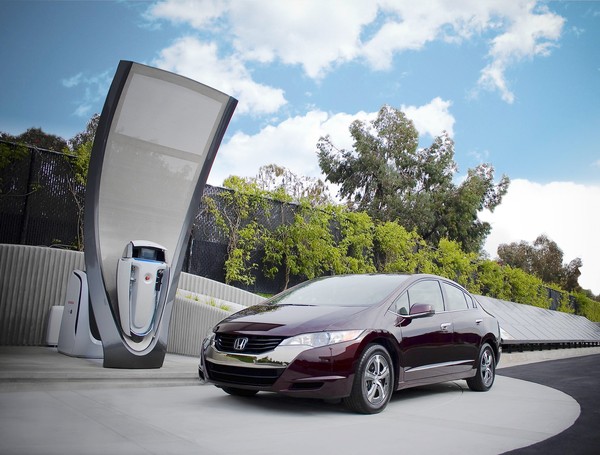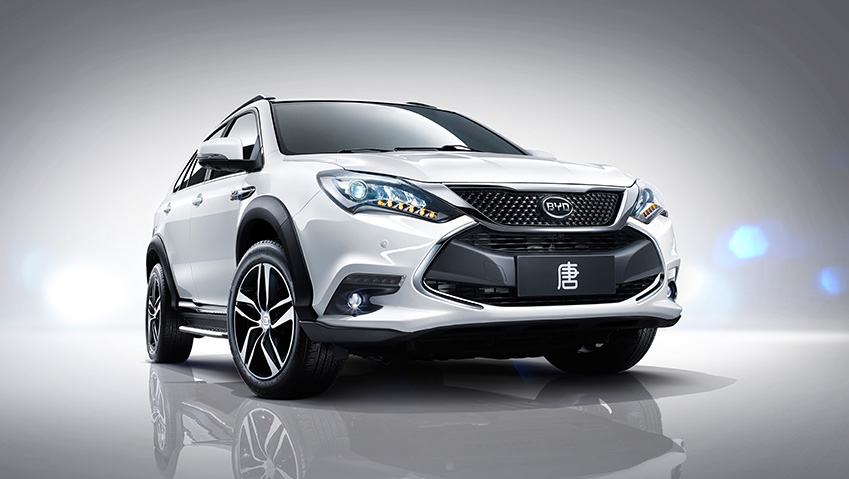
Called residential hydrogen refueler, only one currently exists on the Torrance campus of Honda R&D behind a security guard and a locked gate. This system is designed to power Honda’s limited-production FCX Clarity sedan and the other hydrogen fuel-cell vehicles.
Residential Hydrogen Refueler uses solar panels at 6-kilowatt array of thin-film cells, to power a machine the size of a mini-refrigerator that sips in H2O and breaks it apart into hydrogen and oxygen gases. The hydrogen is then pumped directly into the car, which uses the gas to generate electricity for the car’s electric motor. There are no fossil fuels, no pollution, and no additional strain on the power grid— and all done at home.
According to Steve Ellis, alternative fuel manager for American Honda Motor Co., the ability to refuel a vehicle at home ranks third among the values consumers see of owning an electric vehicle. Honda’s decision to pursue Residential Hydrogen Refueler followed its involvement with a Canadian company that makes a natural-gas home fueler.
“We saw the same possibility could exist for hydrogen,” Ellis said of the solar-powered hydrogen system. Now operates entirely with a new high-efficiency solar array sized to fit an average American roof and able to support typical driving habits, about 10,000 miles per year.
Jack Cusick, 41, the assistant principal of Newport Harbor High School in Newport Beach is talking about the burgundy-colored Honda he’s been leasing for the last 18 months and will need to return in January 2012. He is one of 20 participants in the Clarity programs, which began in July 2008 and involve 80,000 people worldwide, had applied. Cusick’s lease is steep: $600 a month. He still finds the price reasonable because it includes regular maintenance, comprehensive and collision insurance as well as the cost of hydrogen.
Many of the state’s weights and measures departments haven’t yet determined what to charge for a gaseous fuel measured in pounds of pressure rather than gallons of liquid.
“When I was a kid, they told us in the 21st century we’d have cars that fly. I don’t have a car that flies, but this is good enough for me,” Clarity driver Cusick said. Fueling cars at home is the future, he said. “Now that I’ve had the opportunity to not only see a hydrogen car working but actually drive it, I don’t see any reason to go back to anything else.”
Equipped with seat warmers, satellite radio, dual climate controls and radar-activated brakes, among other features, the Clarity is luxurious. It’s also outrageously expensive — most likely worth at least $1 million because of the high cost of developing the technology and low volume of cars in production. Honda won’t reveal a price for an individual vehicle, but when these cars are finally available for sale; their cost will be comparable with luxury sedans.
Other hydrogen fuel-cell cars already exist. Made by GM, Toyota and Mercedes, they currently are available only for lease, as with the Clarity. Most of the lessees are in “station clusters,” specific geographic areas that have hydrogen fueling stations. It’s the scarcity of these Residential Hydrogen Refueler stations that’s seen as one of the biggest barriers to mass adoption of fuel-cell cars.
First two questions arise, how quickly will the home hydrogen refueler follow and how much it will cost? Nobody knows for shore. We talk about a promising technology that advances the trend toward consumers detaching from a fossil-fuel economy and becoming more self-sufficient.
It’s a future in which American homes are less reliant on a large-scale infrastructure — power grids, water districts and the like — and provide at least some of the solutions themselves via solar panels, gray-water systems, rainwater harvesting and home-based car-refueling technology.
But how far into the future can be this dream realized? According to statements from automakers and a “memorandum of understanding” signed in September by manufacturers such as Daimler and fuel providers including Shell, Honda, General Motors, Toyota, Mercedes and other auto manufacturers have indicated they likely will begin selling hydrogen-powered production cars to consumers in 2015.
Inspired by Susan Carpenter, LA Times



